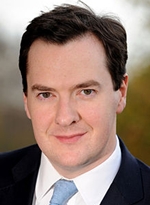Fitch places UK on rating watch negative
23 Mar 2013
 The UK moved closer to losing its top credit rating with Fitch Ratings after chancellor of the exchequer George Osborne said debt would increase more than previously forecast.
The UK moved closer to losing its top credit rating with Fitch Ratings after chancellor of the exchequer George Osborne said debt would increase more than previously forecast.
Citing weak recovery in the UK and sharply rising national debt, in December S&P downgraded the country outlook for the UK to ''negative'', warning of a ''one-in-three chance of the agency lowering the ratings in the next two years.
" The UK is already in the ''negative outlook'' category with both Moody's and Fitch, who plan to review the country's AAA status next year (See: S&P threatens to downgrade UK's credit rating) while in February Moody's stripped it of its coveted top-notch triple-A rating (See: Moody's strips UK of 'AAA' sovereign rating).
Fitch said in a statement in London today that the UK was placed on rating watch negative, ''indicating a heightened probability of a downgrade in the near term.'' The company would see a review of the grading completed by the end of April.
''The persistently weak performance of UK growth, in part due to European growth, has increased uncertainty around the U.K.'s potential output and longer-term trend rate of growth with significant implications for public finances,'' the ratings company said.
The move came two days after Osborne's annual budget, when he reduced his growth forecast and said it would take longer than previously expected to lower the UK's debt. Moody's Investors Service took UK's rating down to Aa1 from Aaa on 22 February citing the economic outlook and challenges to the fiscal program.
Osborne told Parliament in his 20 March budget speech that the independent Office for Budget Responsibility (OBR) cut its 2013 growth projection to 0.6 per cent from 1.2 per cent. Over the five fiscal years starting in April, the deficit would total £434 billion pounds ($660 billion), £55.7 billion higher than forecast in December.
The OBR also expected net debt to start falling in 2017-18, a year later than previously planned.
It was the second instance of the debt target slipping. Net debt would peak at 85.6 per cent of GDP in 2016-17.
The OBR had earlier put the peak at 79.9 per cent of GDP in 2015-16.
Though not unexpected, Fitch's move would come as another setback for Osborne. He had put his reputation at stake over setting right UK's public finances and had promised to protect its triple-A rating.
According to the UK finance ministry, which was three years into an austerity plan, Fitch's announcement showed there were no easy answers to problems built up over many years.
According to the opposition Labour Party, leading in the polls before an election due in 2015, Osborne's budget had been a "wasted chance" to change economic course. It wanted that the government water down its austerity policy and do more to find growth.
"Osborne's plan has catastrophically failed on growth, living standards and the deficit," Labour finance ministry spokesman Chris Leslie said in a statement.
Fitch had first warned that UK's rating was under threat in March 2012, noting debt levels were already "significantly above the AAA median" with the government having very limited room for manoeuvre.



















